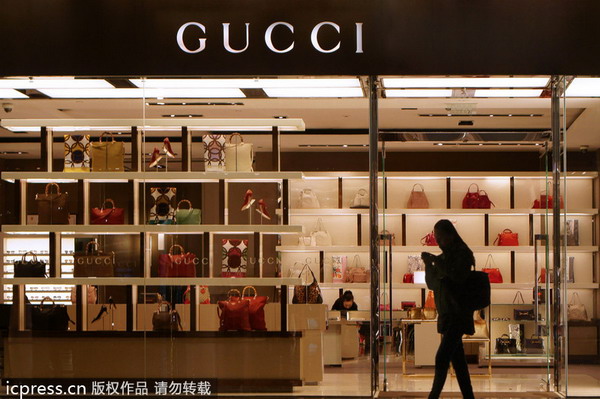

|
 A customer walks past a Gucci outlet in Beijing, Nov 23, 2013. Though China's current anti-extravagance drive is hitting luxury sales hard, the market is still huge, especially with smart and increasingly fashion-savvy consumers. [Photo / icpress.cn] |
BEIJING -- Though China's current anti-extravagance drive is hitting luxury sales hard, the market is still huge, especially with smart and increasingly fashion-savvy consumers.
According to a recent Bain & Company report, the growth of luxury sales has slowed. However, Billy Ip, the manager of Seasons Place luxury shopping mall in downtown Beijing, still believes the prospects for the luxury market are rosy.
With the increasing affluence of ordinary Chinese people, luxury consumption will gradually become a lifestyle choice instead of ostentation, Ip said.
Luxury consumption by Chinese people around the world is expected to reach $102 billion this year, accounting for 47 percent of global luxury sales, according to a report by Fortune Character, a luxury market consultancy. Chinese buyers are the undisputed kings of the global luxury market, it said.
Zhou Ting of Fortune Character institute said that with the anti-graft and frugality campaigns, the luxury market will rely more on entrepreneurs and white-collar workers in cities, Zhou said.
"These groups of consumers will be more rational in luxury purchases. They are looking for things that are worthy and are willing to spend money on items with better quality, rather than a sheer display of wealth," she said.
Many Chinese people got their first taste of the international fashion world in 1979, when French designer Pierre Cardin held the first fashion show in China.
Well-known luxury labels in China also include Chanel, with its legendary Chanel No 5 perfume, as well as Prada, especially after the hit movie "The Devil Wears Prada" was screened in China in 2007.
However, Zhou noted that Chinese consumers' fashion taste will become more diversified in the future.
Li Jing, a 33-year-old fashion lover in a city in East China's Jiangxi province, said that after having bought quite a few expensive items, she is no longer obsessed with the famous "LV" monogram on Louis Vuitton bags.
"Instead of the big names, now I would like to look for luxury goods that cost me less but suit me more," she said.
An increasing number of Chinese customers are also turning to custom-tailored products, according to Zhou.
Ip said the bestselling products in the market will be "light luxury" merchandise that caters to upscale consumers between the ages of 25 and 35, and that this part of the market will not be directly affected by the anti-graft campaign.
Meanwhile, dazzling brands are still a huge magnet for younger Chinese -- a group of potential future buyers.
To celebrate her 24th birthday, Kitty Han, a graduate student in Beijing, spent about 400 yuan ($66) and bought herself an Armani foundation, the first luxury brand item she has owned.
Although having a luxury brand in hand makes her happy, Han said the purchase was not merely out of blind admiration.
"I need decent make-up when I am hunting for a job, and I've learned from the Internet that this product has a sound reputation among users," she said.